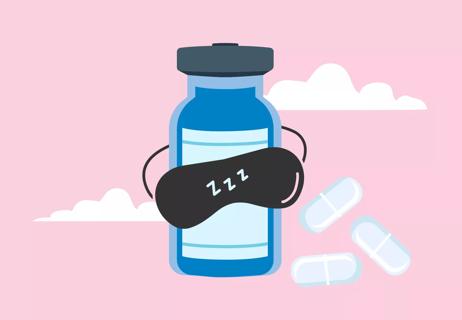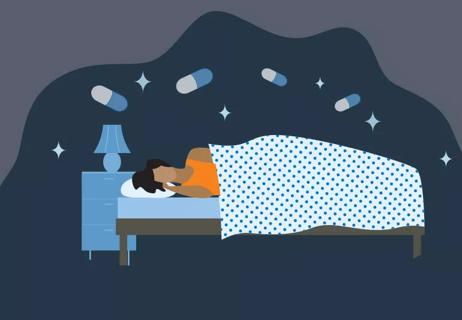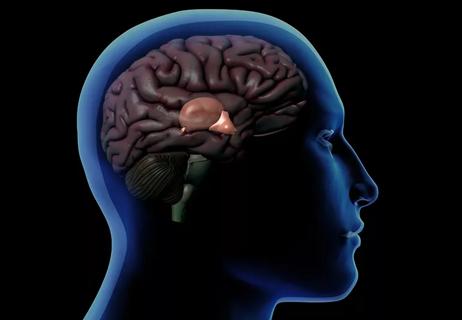This sleep supplement may have side effects, but dependency isn’t one

If you’ve turned to (or are still considering) melatonin to help you snooze away into a dream world, you’ve probably been curious about how it works and affects your body. You may have read about grogginess and bad dreams as side effects — but can you become physically addicted to it?
Advertisement
Cleveland Clinic is a non-profit academic medical center. Advertising on our site helps support our mission. We do not endorse non-Cleveland Clinic products or services. Policy
“Melatonin is a hormone that is naturally made by your brain in response to darkness,” says sleep specialist Marri Horvat, MD. “When someone takes melatonin, they are either trying to increase the amount of this hormone overall or increase the amount they have in their body at a certain time to help them fall asleep.”
While there are some possible setbacks to taking melatonin (depending on how your body reacts), it isn’t addictive. Turns out, even if you depend on melatonin to make you fall asleep, it won’t cause your body to become dependent on it.
“As we age, we have a natural decrease in the amount of melatonin we produce, so supplementation can often be helpful,” Dr. Horvat explains.
Read on to find out what we know about melatonin and why it’s not addictive.
No, melatonin isn’t addictive, butthere are questions surrounding if it can end up harming you if you use it too long.
Some people wonder if melatonin is a substance that can raise your body’s tolerance — causing your body to need more and more. These are all symptoms of addiction, but they haven’t been shown to be associated with melatonin supplements.
“Melatonin is not known to be an addictive supplement,” answers Dr. Horvat. “Typically, if someone is concerned that they are having side effects, they can stop the medication altogether.” There’s no need to wean yourself off of it. But your insomnia will usually return to the state before you started taking the medication.
Advertisement
If you can’t become addicted to melatonin, can your body become dependent? Being chemically dependent on something means that your body becomes used to a certain substance. If you’ve been researching the effects of melatonin, you may have stumbled across speculation that taking the supplement for too long could cause your natural melatonin production to go down.
But there’s no proof that this is the case.
“Your body is naturally dependent on melatonin already,” explains Dr. Horvat. “It needs this hormone to help you fall asleep, which is why we produce it. There is no concrete evidence to suggest that taking melatonin will suppress our body’s ability to produce melatonin. The idea that our bodies could become dependent on an external supplement has not been proven.”
In other words, you shouldn’t be concerned about becoming addicted or dependent on melatonin tablets.
Addictive or not, melatonin should still be taken with care. The amount of melatonin you should take can range, depending on if you have a sleep disorder or are just trying to get over some jet lag. Either way, it’s important to take note of the different dosages for this supplement.
“For help falling asleep, we typically recommend 1 to 3 mg taken one to two hours before your desired sleep time,” says Dr. Horvat. “Higher doses of 10 to15 mg have limited use, and are usually only beneficial for people with problems such as REM sleep behavior disorder.”
So, does it matter if you’re taking melatonin every single day? According to experts, there isn’t any harm in taking the supplement for extended amounts of time, especially if it’s improving your sleep. Dr. Horvat just points out that you should keep your healthcare provider in the loop.
“There is not much data on long-term safety of melatonin, so we don’t know if there can be long-term consequences,” he explains. “If you are taking this to help you sleep for more than a month consistently, it may be worthwhile to speak to your doctor.”
“Some people are more sensitive than others to melatonin, but it is hard to know which patients will respond this way,” says Dr. Horvat. “Interestingly, a side effect of melatonin is headache. But in some people, melatonin is an effective headache preventive medication.”
“Most people do not have side effects, but some can experience increased sleepiness when waking up, headaches or dizziness,” says Dr. Horvat. As this isn’t an FDA-regulated supplement, it’s important to note the dosage you’re buying (as well as any other ingredients it may have). Because melatonin isn’t regulated by the FDA, levels of melatonin have been shown to be 80% to 400% of the advertised amount. Plus, when considering melatonin for your child, there’s other safety measures to follow.
Advertisement
Even if it’s not addictive, it’s still important to know that melatonin supplements can affect everyone a little bit differently. Be sure to watch for any side effects after taking the recommended dose. If your symptoms get worse, stop taking the supplement and talk to your healthcare provider about other options to help you get the rest you need.
Advertisement
Learn more about our editorial process.
Advertisement

Tart cherry juice contains natural compounds that may support better sleep

Melatonin won’t stop birth control from doing its job, but the combo could cause unwanted side effects

Too much of the supplement can lead to an upset stomach, vomiting and diarrhea

This hormone helps your body prepare for sleep

Does this supplement help you get more ZZZs?

What to expect after taking this increasingly popular sleep aid

The short answer from a sleep specialist

Wearing a scarf, adjusting your outdoor activities and following your asthma treatment plan can help limit breathing problems

Your diet in the weeks, days and hours ahead of your race can power you to the finish line

When someone guilt trips you, they’re using emotionally manipulative behavior to try to get you to act a certain way